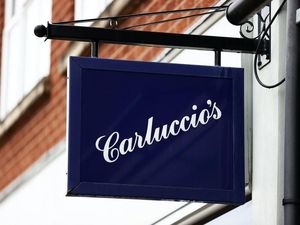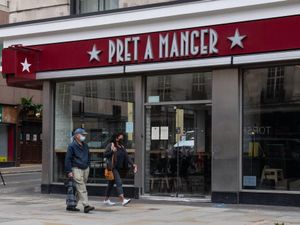Pandemic's huge toll on the region's jobs market
As the West Midlands prepares for a tightening of the coronavirus lockdown restrictions, there looks to be little let up in the impact the pandemic is having on the economy.
New unemployment figures out today are expected to show a sharp increase in the claimant count, which had already been growing since the start of the pandemic.
Approximately 730,000 jobs were lost during the first four months of the lockdown, with high-profile redundancies across the economy.
While the official unemployment rate remains at an historically low level, this figure has been masked to some extent by the furlough scheme. Many businesses which closed during the lockdown are yet to reopen, and concerns are growing about what will happen when furlough ends next month.
Unsurprisingly given the 'stay at home' message during the height of the lockdown, the travel, leisure and hospitality trades have been hit particularly hard.
The Restaurant Group, one of Britain's largest casual dining companies, has made several announcements regarding job losses. The first one came on March 27, in the early days of the pandemic, when it announced 1,500 jobs were at risk at its Chiquito Tex-Mex dining chain. The group said it would be placing Chiquito into administration.
On June 3, 2020, the company further announced that a "large number" of its Frankie & Benny's outlets would not reopen after the lockdown, with up to 120 of its 236 restaurants set to close permanently. It made a similar announcement regarding its London-based Garfunkel's chain, and a week later the company – which also owns the Brunning & Price gastropubs and Wagamama Japanese restaurants – announced that up to 3,000 jobs across the group would be lost.
Rival chain Carluccio's, which had 71 restaurants including ones in Birmingham and Shrewsbury, was placed into administration on March 30, putting 2,000 jobs at risk. It was later bought by the Boparan Restaurant Group, founded by Black Country businessman Ranjit Singh Boparan, saving 31 restaurants and about 800 jobs.
The rival Casual Dining Group, which owns the Cafe Rouge and Bella brands, announced on July 2 it would be going into administration. It was revealed that 91 of its 250 restaurants would close with the loss of 1,909 jobs, about a third of its workforce.
The Azzuri Group, which owns the Zizzi and Ask Italian restaurants, announced a further 1,200 job losses on July 17. Pizza Express has also closed 73 of its 470 restaurants, including those at Stourbridge, Walsall, Ludlow, Stafford and the Merry Hill shopping centre near Dudley.
Chancellor Rishi Sunak attempted to revive the industry with the Eat Out to Help Out scheme during August, but the pub and restaurant trade continues to look precarious, particularly as regulations look set to tighten.

Pret a Manger has also announced 2,800 job losses, Pizza Hut 450, Yo! Sushi 250, while another 1,600 jobs are under threat at Burger King.
Last month, pub giant J D Wetherspoon said it would be shedding 110-130 jobs, and chairman Tim Martin said this week that trade continued to be quiet.
Mr Martin said: "Trade was very quiet over the weekend, as the public weighed up the evidence about the alleged dangers of going out. Wetherspoon sales were 22.5 per cent below the equivalent Saturday last year."
Last month, the group said like-for-like bar and food sales were down 16.9 per cent for the 44 days to August 16, compared with the same period last year.
Trade groups, including the British Beer & Pub Association, have warned that the new 'rule of six' will halt the recovery of hospitality firms without extended financial support for the sector.
The airline industry has been another major casualty, with British Airways announcing 12,000 redundancies. Virgin Atlantic announced 3,150 redundancies in May, followed by another 1,150 earlier this month. Aer Lingus said it would be shedding 500 jobs, while EasyJet announced 4,500 redundancies worldwide, and Ryanair 3,000.
This has had a knock-on effect on related industries, with Heathrow Airport declaring in June that at least 500 jobs were likely to be lost, and Belfast Airport said 45 were set to go. Aviation giant Airbus revealed on June 30 that 1,700 jobs were to be shed, while Derby-based Rolls-Royce said 9,000 jobs were on the line. Swissport, which provides ground and cargo-handling services at airports, announced 4,556 redundancies in June.

The lockdown had a significant impact on many businesses in the already ailing retail sector. One of the most high-profile cases has been that of struggling department store chain Debenhams, which last year closed its store in Wolverhampton's Mander Centre after just 18 months' trading. In April, the group was placed in administration – for the second time in 12 months – and revealed its store at the Weavers Wharf retail park in Kidderminster would not reopen. In August the group, which has branches at Walsall, Telford, and the Merry Hill centre, said it would be cutting 2,500 branches. The future of the retailer remains in the balance, with restructuring firm Hilco Capital understood to have been instructed to prepare contingency plans for shutting all 124 shops – with the potential loss of 14,000 jobs – should a buyer not be found.
In August, John Lewis announced the closure of its shop in Birmingham's flagship Grand Central shopping centre, just five years after it opened. The decision is part of a package of cuts which has put 1,300 jobs at risk.
Marks & Spencer, another famous name which has experienced a turbulent few years, said 950 management jobs were set to go in July. But the situation took a much bleaker turn last month, when the company announced that up to 7,000 jobs would go before the end of the year as it struggled to turn around losses.
Selfridges, which has a store in Birmingham's Bull Ring centre, announced 450 job losses in July, while the Arcadia group, which owns Top Shop, Top Man, Dorothy Perkins, Burtons and Evans, revealed on July 1 that 500 jobs were set to go. W H Smith is also shedding 1,500 staff.
The motor industry, another sector which had already been experiencing a lean few years, has also suffered. Britain's biggest car maker, Jaguar Land Rover, announced in June that 1,100 jobs were to go. The following month its logistics partner DHL announced that a further 2,200 jobs were at risk at Jaguar Land Rover plants. Bentley Motors announced 1,000 redundancies on June 4, just hours after luxury rival Aston Martin revealed it would be shedding 500 jobs.
The rail and bus industries have also suffered, with train manufacturer Bombardier announcing 600 job losses, and bus maker Alexander Dennis cutting 650 job cuts.




